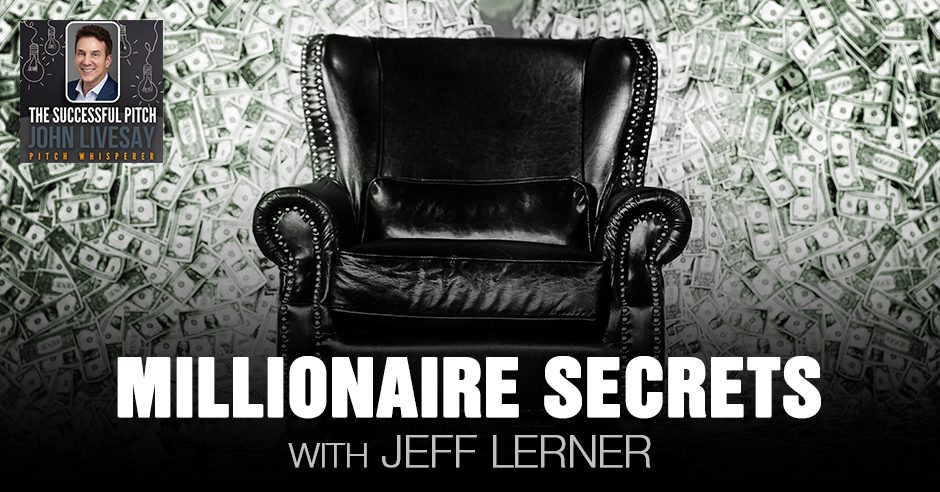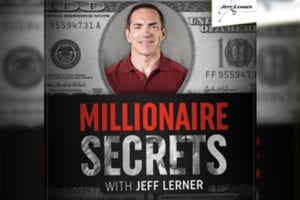Millionaire Secrets With Jeff Lerner
Posted by John Livesay in podcast0 comments
Getting to the top is not worth it if you are not doing what you love, or you still feel empty despite having everything. True professional success is all about indulging in your passion, keeping a healthy body, and having a deep connection with others. John Livesay is joined by the Cofounder and CEO of ENTRE Institute, Jeff Lerner, in discussing the secrets of attaining worthwhile business success, from taking care of your body to knowing the right way to eliminate money-related problems. Jeff looks back on his life that led him to become the entrepreneur he is today, starting from his piano performing days, getting divorced twice, and being a father figure of an integrated family.
—
Listen to the podcast here
Millionaire Secrets With Jeff Lerner
Our guest is Jeff Lerner who shares the 3P’s to success, physical excellence, personal excellence, and professional excellence. He does a deep dive on what the word professional means to him as well as what the word desire means. You’re going to want to listen to how he’s completely turned his life around and figured out how to be successful. More importantly, how you can too. Enjoy the episode.
—
Welcome to the show. Our guest is Jeff Lerner, who is the Cofounder and CEO of ENTRE Institute. He is a serial entrepreneur, speaker, author, and musician. He’s a native of Houston, Texas where he spent most of his twenties attending university by day while working nights at one of the top piano players, a gig, which found him playing in the homes of billionaires and business owners. This is what triggered his interest in entrepreneurship. In 2008, when he was only 29, after multiple failures, during a restaurant franchise that left him with over $400,000 in debt, he found his calling as a digital marketer and paid that debt off in eighteen months. Jeff, welcome to the show.
Grateful to be here, John. I appreciate you having me.
Let’s start with your own little story of origin. You can start by playing the piano. I love that story of seeing how successful people who are entrepreneurs got to live and being in the entertainment and saying to yourself, “What’s the secret sauce here?”
That was a powerful transformative experience for me. I’ll set it up by backing up a little bit. I’ve had one job in my life and it’s when I was sixteen years old. I worked for three weeks in the office supply room at a major law firm. That meant that I worked for legal secretaries. I don’t know what big five legal firm culture is now but I can tell you that in the mid-‘90s, legal secretaries were not the happiest bunch of people. As they say, they got what rolls downhill.

Professional Success: When you start screwing stuff up, and it involves kids, it’s a whole other level of carnage and negligence.
It rolled downhill from the attorneys to their secretaries. They paid it forward down to me in the lowly supply room and like, “I need a print cartridge. My boss has a deposition due at 2:00 and if he doesn’t have it, it’s going to be your ass.” I’m like, “I’ll bring you a print cartridge. Take a chill pill.” Three weeks was all the abuse I can handle. I managed to get myself fired. Apparently, I was disrespectful to a secretary. I’m sure she was being very respectful to me though. I was like, “I’m never doing that again. I better figure out something that I can do so I can make a living and make a life in this world without having to ever take that again.”
I became a musician. It was a very strategic decision. It wasn’t like I had some deep longing to express myself through the creative arts. It was more of like, “What do I know already that I’m good at it and I can develop into a tangible, monetized skill?” I went hardcore into piano. I didn’t start seriously playing piano until I was seventeen years old but I had played guitar previously. I knew I was a good musician, but the problem with guitar is if it’s acoustic, it’s not loud enough to play by yourself. If it’s electric, nobody’s going to hire you without a band for the most part.
Generally, you don’t get to keep all the money. A lot of times you get booked to show up, there’s already an instrument there and you get to keep all the money. Especially if you learn to sing, you can make decent money. Again, it was very pragmatic. I was like, “I’m going to learn the piano. I’m going to start learning to sing. I’m going to learn the Great American Songbook. I’m going to learn contemporary, radio hits, and I’m going to go get jobs.” It was a little harder than that. It took me three years to get good enough to play professionally.
I dropped out of high school at seventeen. I was like, “High school holds nothing for me. That’s going to graduate me to learn how to go get a job. I don’t want to do that so there’s no point. How to navigate that with my parents?” It was interesting. They knew me. They’re like, “If he decides he’s going to do something, there’s no stopping him. We can either make our home life miserable because he’s going to be pissed off all the time because we’re fighting him or crazy as it sounds, we can support him in becoming a professional piano player.”They bought me a piano. They said, “You better practice your ass off, son.” I did. It took three years. I practice 8 to 10 hours a day as much as I could. The only days I took off were because my hand was so stiff, I couldn’t move my fingers. In three years, I became good enough to get a scholarship at the collegiate level and start getting hired for gigs. It ended up taking me almost ten years to finish college but I did graduate with a degree in Jazz, Piano Performance, and Music Composition and a minor in Finance which is most notable because I had dropped out of high school.
[bctt tweet=”Physical, personal, and professional excellence are all needed for success. Stop trying to take shortcuts.” username=”John_Livesay”]
I still managed to get into college on a music scholarship. That was the musical part of the plotline but what was transformational for me were few things. One was, I did get to experience what it’s like to make a living doing something that you love. Once you’ve experienced that, it’s hard to ever imagine going away from it. I was hooked at that point that I had made the right decision even though life was hard and I did not make very much money. I tried to get married twice in my twenties and blew it both times. I was twice divorced by the end of my twenties. There are two classes of people that are hard to be married to.
One is startup entrepreneurs. The other is aspiring musicians. I was both. God bless my ex-wives. I don’t necessarily fault them for their second choice. The first choice to marry me, I questioned that but the one to divorce me, that makes some sense. The biggest thing in my twenties was as a gigging piano player, it’s not hard to get the elite gigs that pay the best. You have to get a suit that fits and not smoking. If you do smoke, do it in such a way that it doesn’t make you stink like cigarettes. You have to be on time and respectfully carry on a polite conversation but not over-talk because the clients don’t want you chatting up the guests. You have to know a lot of songs, and be a decent piano player. Since I was one such person, I got in with this good agency. They started booking me.
I played in the homes of Tilman Fertitta who owns the Houston Rockets, Jim Crane who owns the Houston Astros, Bob McNair who owned the Houston Texans. He passed away in 2017 but I played in his home, and Andy Fastow, the CFO of Enron. I played in some big billionaire mansions and I got a real taste of how much money there is out there. I was in a unique position because I would always get to the gigs early so I could warm-up, set up, play the piano, and feel the keys. Whenever I could, I would try to corner these guys for at least a minute or two of conversation.
Usually, I would frame it as like, “Do you have any favorite songs? How loud do you want me to play? What mood do you want me to set? By the way, you’re successful. Do you have any tips? You got a lot of zeros in your bank account. Anything you could share with a broke musician?” I started hacking my way into billionaire mentorship from some of these guys and got a real strong vision of what my life could look like. They frankly alienated me from my musician peers because they’re all about struggle and the art, and I was a jazz musician.

Professional Success: You can change who you are through cognitive restructuring, even though it can be brutally painful and exhausting.
There’s a real lore in jazz around the struggle. I was like, “Screw this. I want to be rich. I want to take care of people. I want to bless the world. Honestly, I want to be able to make music someday on my terms.” I heard a story about how Prince built this whole recording studio in his house. He started his own record label. He could release his albums and do all his recording. He answered to no one. I was like, “If I’m going to be a musician, I want to be a musician like that.” I realized I was never going to get there for me through playing piano so I tried to start businesses.
All through my twenties, I rattled off on the last interview I did, it was nine businesses that I failed at. Fast forward to 2008, the Great Recession destroyed the economy. In 2006, I had gone through the funding and application process for two franchise restaurants. I own these two sandwich shops. I thought I was going to be a traditional American franchise millionaire dude, instead it all went out of business with the Great Recession. In 2008, I was $495,000 in debt. I couldn’t afford my apartment. I ended up moving in with my estranged and soon to be ex-wife’s parents, living in their spare bedroom, dodging creditors who were calling their house so you can imagine how popular I was.
The hard thing about owing that much money on those types of loans is of the $495,000 in debt, $330,000 of it was to the US Treasury because these were SBA bank loans that are backed by the US government. It’s no different than owing $300,000 worth of taxes. You don’t disappear from that unless you die. I was hiding from the US government in my ex-wife’s parents’ house trying to figure out how the hell I was going to get my life back on track. That’s when I discovered in 2008, I remember it clear as day, it was Monday of Thanksgiving week, November 2008. Three days before Thanksgiving, for $395, I bought a course on affiliate marketing. It turned out that I was good at a keyboard whether it was a piano keyboard or a computer keyboard as it turned out. Mostly, I had the ethic to practice. I knew how to sit there and grind for 8, 10, 12 hours a day leaning in, deciphering complex musical passages.
You do the work and you give it time. As a musician, I know how long it takes to develop competence. It’s something that is sophisticated. Years, thousands of hours, and that’s how I approached internet marketing. Thankfully, I was a quick study. I had a great training course, a good mentor. In eighteen months, I paid off $495,000 in debt. I’ve been doing some form of new economy entrepreneurship ever since. I’ve done real estate, Shopify stores, affiliate marketing. I had a digital agency, I create my own courses online. You name it, I’ve done it.
[bctt tweet=”Always solve the money problem first to prove to yourself that money wasn’t the problem.” username=”John_Livesay”]
The thing that stands out for me, besides the wonderful metaphor of the keyboard from a piano to the keyboard of the computer, is the lessons you took from learning and becoming a professional musician, not from an artistic standpoint but driven money-making, “I don’t want to work for anybody else,” mission of discipline to practice, being on time. I can’t emphasize that enough to anyone. Since you make a virtual appointment, it doesn’t mean you get to be late, especially if you’re pitching to a client or an investor. How you do one thing is how you do everything. I’m wanting to tap into that, Jeff, because that’s one of the things that made me want to have you on the show. Finally, not talking too much. We both are comfortable in selling things and selling ourselves.
The biggest mistake I see a lot of people making is they talk too much about the features. They bore people. They’re not telling stories, and the worst mistake ever is after someone says bye, but they keep talking. When you brought that up, I thought, “I don’t hear a lot of guests talking about that being one of the keys to their success.” In this case, as a piano player. When you transfer that to an entrepreneur, a salesperson, and having a successful pitch, the exact same three things, discipline, be on time, don’t talk too much, that’s like table stakes. If you’re doing it and most people are only doing 2 of the 3 or only 1 of the 3, you’re already ahead of the game. In my mind, if you can tell better stories, which clearly you’re great at, because music is a story. Each piece of each song tells a story so you have the ability to transfer so many of those skills to that.
You’re doing at the ENTRE Institute these ways of excellence and you have three of them. There’s a personal one, a professional one, and a physical one. Many times, people sacrifice 1 of the 3. We see all these wealthy people that are one beat away from a heart attack. You’re like, “You’re walking commercial of what that looks like.” It’s because the physical is not a priority or the sleep deprivation is a badge of honor and all these crazy behaviors or the multiple divorces and miserable life. You had said you have some insights for people. I bet a lot of people are going to lean in now of you can show us how to be excellent in all three. Please start with the personal. What tips do you have for people on having an excellent personal life while being an entrepreneur?
What’s funny is this is the one that I thought I had figured out because I’ve always been a reasonably fast, smooth talker. I thought that meant I was good with people. I was a train wreck of a listener like, “I got to stop talking and let other people talk.” I was an only child. I thought I was the sun and everyone else was a planet. I thought that my personal skills were well-developed. It wasn’t until my mid-30s, I realized how truly terrible they were. I’m jumping ahead in the story but in my early 30s, I started making money but I’m still not happy even though I’m out of debt. I came off of another interview, but this was what we ended up talking. It’s important to solve the money problem so that you can prove to yourself that money wasn’t the problem. As long as you have a money problem, it’s easy to make that your problem.

Professional Success: Professionalism is an intentional profession of faith, belief, testimonial, and value.
I solved it in my early 30s and I was still miserable. I was a divorced bachelor living in New York City, trying to live a cool Manhattan bachelor life which was such a façade and a distraction. I met this wonderful woman who lived in St. George, Utah, a little town I’d never heard of. She was a widow. I met her at an event that her dad was hosting, and I was the guest because I’d been an affiliate for his company. We hit it off. She had three kids and her youngest was two at the time. I went and visited. It didn’t click with the concept of a dad. It wasn’t like, “You’re not my dad,” because she’d never had a dad. It was like, “Who’s this guy?” I came out a few more times. I was head over heels in love with this woman.
I was like, “This is the woman I want to like to hang out with. There’s no one like this in New York.” I’m flying out to Utah every weekend from New York. It’s 4, 5, 6 weeks into that process, then all of a sudden, she’s like, “Daddy.” Suddenly, my girlfriend and I are like, “What happened?” We didn’t plant or suggest that. In fact, we’ve been very careful. Here’s the thing, I pretended to be mortified. I was so happy. Something came over me and I was like, “This is it. This is what I want for the rest of my life.” Within a month after that, I had exited everything else I was doing in New York City. I had loaded up a U-Haul, I was driving out to Utah, and I’ve been here ever since. The reason I’m telling you this in terms of the personal excellence, personal relationships, communication, connection, all that good stuff.
Now I was the father figure in an integrated family. She had two boys and a girl and the stakes are high here. I’ve been through a divorce. It sucks when adults screw things up. When you start screwing stuff up and involves kids, it’s a whole other level of carnage and negligence. It was like, “Let’s go get therapy. Let’s go get help. Let’s do this right.” She’d been divorced. I’d been divorce. That’s what changed my life. Early mid-30s, I go get in with a good family counselor. I thought I was going for a couple months to follow instructions, put the Legos together, and it was all going to be grand. I spent 2,000 hours in therapeutic environments over the next five years.
It doesn’t surprise me because you’re focused on the number of hours you put into learning how to play the piano, you’ve taken that ability to focus and commit to making your personal life as good as it can be.
[bctt tweet=”Excellence must always center on how you connect with people and how you manage energy in conversations.” username=”John_Livesay”]
Here’s the thing, I love it. You talk about listening. It’s stop talking, responsive listening. I say those two words together or people are like, “I should listen and be more responsive.” There’s an art to responsive listening like empathy. I got tested in the early days of therapy. My empathy on a scale of 0 to 100 was a 4. I’m an only child. I don’t need to hear about other people’s problems. I don’t walk out on anybody’s shoes. Years later, I figured out what if I retook the test. It was up to an 80. You can change. Not what you think and what you do. You can change who you are.
It’s a process called cognitive restructuring. It is brutally painful and exhausting. To this day, my therapist says, “You two are some of the only people I’ve had that were willing to do the work.” In ENTRE, when I talk about personal excellence, I’m talking about how you relate, how you connect with people, how you manage and control the energy in conversations. I’m talking about power dynamics. We teach something called nonviolent communication. One of the most important skills in life is making it so that every time somebody finishes a conversation with you, they feel good.
Wouldn’t it stand to reason that would be a useful skill? There’s a way to do it. Study transactional analysis, non-violent communications, Adlerian psychology. There are actual ways that you can become excellent in relationships that not only make your personal life better, not only make your relationship with yourself better. Honestly, they’ll make you a crap load of money. We’re here to talk about pitching and selling. Let’s say I’ve made millions. These skills added a zero.
Let’s dive into that. Be professional excellence, especially around the world of affiliate partnerships. For those who may not know 100% what that is, it can be everything from someone selling a course or a training program and people promote it for you and they get a percentage of what your revenue is. What’s happening in my perspective, of course I want to hear yours, is transferring of trust. The skills that you learned, empathy and listening, are what allows people to want to partner with you and then have those people who are following them say, “If Jeff trusts John, then I can trust John.” That’s the foundation for then seeing of whatever John is offering wouldn’t even be something but at least the ears are open. “If Jeff has vetted him in this, then this is a safe email to open,” or whatever it is.

Professional Success: Money is the last indicator of health. It must always start in the body.
Affiliate marketing is technology applied to referrals. We’ve had referrals as old as time, “John, you’re in Austin. You got to check out that pizza place on MLK.” Imagine if I said, “Make sure when you go in there to give them my name so they know I sent you. They might even give you a discount but also they’re going to know I sent you so they’re going to send me $1 for the referral.” Affiliate marketing is that, only it’s all tracked through digital links. That is what I started with in 2008. I was a full-time dedicated affiliate marketer from 2008 to 2012. I did well with that and I paid off my debt.
At the end of the day, it’s all about communication. I have a very specific definition of the word professional. It’s the 3P’s, Physical, Personal, and Professional excellence. Admittedly, I like it because it starts with P. It fits the pattern. I could say financial excellence, business excellence, or value excellence. Professional is a very specific word, very intentional to profess something. A profession of faith, belief, testimonial, value, or whatever.
There’s so much more to change the way we view business as how we make money or change our career. The way we view our career is how we make money. What are you professing every day through the work that you do? It’s important to change the way we view the business that we do or the career that we have. It’s not how we make money. It’s what we stand for in the world. It’s the profession of our faith, our belief and our identity.
I love that because the basics of being a professional, one of the things is showing up on time which we talked about at the beginning. What’s more than that because it’s energy of your passion that you profess your company in such a way that is not something you’re doing. It’s something bigger and there’s a bigger purpose behind it. Therefore, you’re able to profess your belief in it and that’s what is attractive to people.
[bctt tweet=”Say yes to success by saying no to everything that isn’t success.” username=”John_Livesay”]
You could rate somebody’s career satisfaction by saying, “Is their profession consistent with their profession?”
Finally, the physical element of it. For those who aren’t able to see you in person, you obviously keep in great shape. Whether you’re an entrepreneur, a musician, or an athlete, there is something to be said that your health is your biggest asset. Without it, you’re tying one hand behind your back. Any thoughts you have about the importance of sleep and exercise and all that to be successful?
When I draw the physical, personal, and professional excellence model on a piece of paper or a whiteboard, I draw it as concentric circles and physical is at the center. By the way, I always say them in that order, physical, personal professional from first to last. Money is the last indicator of healthy, sustainable, non-destructive growth. I personally believe it starts with the body. The body is the fuel cell. You cannot power a life, an engine, or a machine if you do not have a charged fuel cell. The way I look at it is, your physical is your fuel cell. It’s the energy source.
When energy projects from your life, what’s the first thing it hits? It hits the people right around you. Your points of impact, those are your personal relationships. I would argue, if you’ve got an energy that positively suffuses the people around you, do you even deserve to have a lot of professional success? If you’re saying, “No, I want my energy to skip my family. I want it to land in the market so I can make a lot of money. I don’t even want to have to have good, healthy energy. I’m going to neglect my body and my family. Hopefully, there’s this peripheral ring of professional, whatever that sends me a bunch of money.” That’s irresponsible. That contravenes the universal law of effort and value.
We need to stop taking shortcuts or trying. The shortcuts don’t exist, but they’ll work for a while and then they’ll call our bluff. We need to stop trying. Take care of your body and the people around you. Again, use the word deserve. The place that you serve from. If you’re serving from the right place, you’re professing something that’s aligned with who you are, you believe in, and it gives value to the world then you deserve professional rewards. That’s how I look at the world. I’m a simple person from the standpoint of when the going gets tough. I can only remember one thing. It’s easy to sit here, you and I can have this coffee shop talk, be intellectual, cerebral, and have all these great ideas.
I’ve got a bookshelf right here. I can pull a book off and read. If I’m in a firefight or if I’m $495,000 in debt, my ex-wife is leaving me, I’m stuck living in her parents’ house, and I have a month to try to figure out how I’m going to generate $40,000 or $50,000 a month or else, I’m going to lose everything. I’m going to have to end up in debtor’s prison or whatever. In those circumstances, when the stress has ratcheted it up, I’m not smart enough to remember all the fancy stuff. I got to have so simple heuristics that I can glom to. The three PS is at the center of my mental universe because it’s always there for me, physical, personal professional. Jeff, where are you faltering? You don’t have the money you want.
Are you taking care of the people you love you? Are you taking care of your health? There’s the problem. It always proceeds in that sequence for me. As far as an execution, there’s only 24 hours in the day. How do I get to have it all? By the way, this is a podcast so people can’t see this, but I’ll show you and you can speak to it. This is my schedule. People will say, how do I do it? I get up at 3:30. I do my morning routine. I practice piano for an hour. I go to the gym for 90 minutes. I have an hour of family morning and breakfast and take my daughter to the bus. It’s 8:00 and I start work. There’s no way around it. Get your butt up, do the work, and be balanced. Here’s the key, you say yes to success by saying no to everything that isn’t success. I got time to do that because I make no time for anything else.
I believe that you might have a free gift for the readers.
I absolutely do. I have an eBook that I wrote. It’s called The Millionaire Shortcut. I am privy to all the studies on human attention spans and how much they like to read long books so I didn’t write one. I wrote a very short book, very big print. It’s even got some pictures, and it’s twenty pages long. You can read it in fifteen minutes. It’ll teach you the fastest way to become successful in the new digital economy. You can get that at MillionaireSecrets.com/JohnL. It’s a special landing page we set up for this episode. I invite you to read it. On that page, you can also subscribe to my YouTube and listen to my show if you’d like.
Jeff, thank you so much for sharing your passion about how we need to show up for ourselves so we can show up for the family and then make the impact in the world that we want with our finances. It’s been great. Thank you for sharing that great eBook. I’m sure lots of people are going to take you up on learning that. I love your story from the discipline of the piano keyboard to the keyboard of your life at this point.
Thanks, John, for having me.
Important Links
- ENTRE Institute
- MillionaireSecrets.com/JohnL
- YouTube – Jeff Lerner
- Better Selling Through Storytelling Method Online Course
Wanna Host Your Own Podcast?
Click here to see how my friends at Podetize can help
Purchase John’s new book
John Livesay, The Pitch Whisperer
Share The Show
Did you enjoy the show? I’d love it if you subscribed today and left us a 5-star review!
- Click this link
- Click on the ‘Subscribe’ button below the artwork
- Go to the ‘Ratings and Reviews’ section
- Click on ‘Write a Review’
Love the show? Subscribe, rate, review, and share!
Join The Successful Pitch community today:
- JohnLivesay.com
- John Livesay Facebook
- John Livesay Twitter
- John Livesay LinkedIn
- John Livesay YouTube
Tags: Business Strategies, cognitive restructuring, entrepreneurship, financial problems, physical fitness, professionalism


